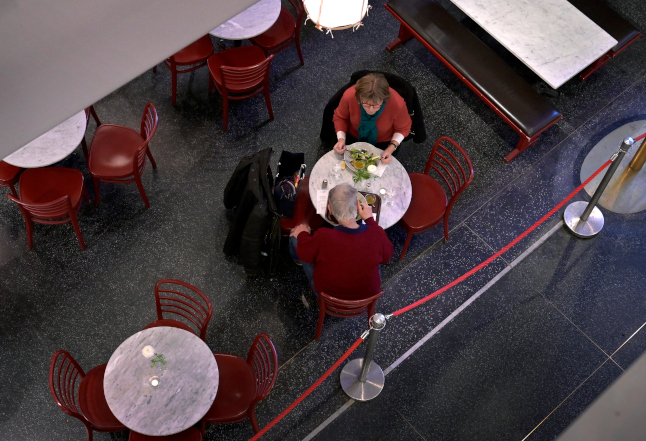What changes about life in Sweden in February 2021?

News on coronavirus restrictions, a tax-related deadline, and an important date for your food calendar are some of the things to plan your Swedish life around this month.
Decisions every two weeks
There's a series of coronavirus-related rules and restrictions that are set to expire in February (we'll explain more about those below). The government has said that it and the Public Health Agency will review these every other week, unless there is a dramatic change in the situation regarding the spread of the virus. The last government announcement came on January 21st, so we're expecting an update this week regarding the current rules.
Post-8pm alcohol ban set to expire (or be extended)
Sale of alcohol at bars and restaurants has been banned after 8pm since December 24th, and before that the ban applied to post-10pm sales. It is currently in place until February 7th, but could be extended if the government thinks it is necessary in order to further bring down the country's coronavirus infections. This ban is legally binding, not a recommendation, so businesses found violating it could face legal sanctions.
Non-essential public services closed until February 7th
Municipalities and regions are urged to keep non-essential public services closed until at least February 7th. This includes for example swimming pools, sport centres and museums. It doesn't apply to libraries, and many are open for essential purposes. Employees at state agencies are also to work from home until at least February 7th.

No alcohol is allowed in Swedish restaurants after 8pm. Photo: Janerik Henriksson/TT
New travel restrictions
The Public Health Agency's proposal for the government to require foreign nationals to show a negative Covid-19 test before entering Sweden is expected to be fast-tracked, and if it is given the green light it should come into force within a matter of days.
The EU has also proposed imposing extra travel restrictions on parts of Europe with very high rates of Covid-19 infections, so we're also expecting a decision on this soon.
Deadline for getting your tax declaration earlier
If you sign up for a digital mailbox by February 25th, you can get your annual tax declaration from Sweden's Tax Agency (Skatteverket) a couple of weeks early.
A digital mailbox lets you receive letters, bills and other documents from Swedish public authorities and companies online rather than having them sent by post. It means you will receive your tax declaration as a PDF between March 3rd and 9th. The actual declaration form will open for everyone on March 16th, and if you prefer to fill out the paper version you should receive that at some point around this time.
Mail delivery every other day
Swedish postal service PostNord will as of February 1st only deliver mail, newspapers and advertising every other day to people whose postcode starts with '2' (southern Sweden). Parcels will continue to be delivered every day. The scheme was trialled in the towns of Lund and Kävlinge last year, and is to be rolled out to western Sweden and the Stockholm area in 2021, and the rest of Sweden by the end of 2022.
Covid vaccinations to be rolled out to over-70s
Phase 2 of Sweden's Covid-19 vaccination programme is set to get under way this month. This phase includes all adults aged over 70, starting with the oldest; people aged 18 and above who receive LSS disability support; and people working in health and care who have close contact with patients. Some regions have made preliminary timetables available, and the best place to find out more is the 1177 healthcare service.
The Local has looked into some of our readers' vaccination questions here.
Don't miss: Fat Tuesday
It may not be as serious as new laws or taxes, but no one can say eating your first semla is not a life-changing experience. The small wheat flour snacks, flavoured with cardamom and packed with whipped cream and almond paste are traditionally eaten on what is known as fettisdag or Fat Tuesday in Sweden and Shrove Tuesday in other Christian countries. The custom started when people ate the sweet treats during a last feast before the Christian fasting period of Lent got under way – so think of it as your chance to fill up on sugar and carbs.
This year, Fat Tuesday falls on February 16th.
Comments
See Also
Decisions every two weeks
There's a series of coronavirus-related rules and restrictions that are set to expire in February (we'll explain more about those below). The government has said that it and the Public Health Agency will review these every other week, unless there is a dramatic change in the situation regarding the spread of the virus. The last government announcement came on January 21st, so we're expecting an update this week regarding the current rules.
Post-8pm alcohol ban set to expire (or be extended)
Sale of alcohol at bars and restaurants has been banned after 8pm since December 24th, and before that the ban applied to post-10pm sales. It is currently in place until February 7th, but could be extended if the government thinks it is necessary in order to further bring down the country's coronavirus infections. This ban is legally binding, not a recommendation, so businesses found violating it could face legal sanctions.
Non-essential public services closed until February 7th
Municipalities and regions are urged to keep non-essential public services closed until at least February 7th. This includes for example swimming pools, sport centres and museums. It doesn't apply to libraries, and many are open for essential purposes. Employees at state agencies are also to work from home until at least February 7th.

No alcohol is allowed in Swedish restaurants after 8pm. Photo: Janerik Henriksson/TT
New travel restrictions
The Public Health Agency's proposal for the government to require foreign nationals to show a negative Covid-19 test before entering Sweden is expected to be fast-tracked, and if it is given the green light it should come into force within a matter of days.
The EU has also proposed imposing extra travel restrictions on parts of Europe with very high rates of Covid-19 infections, so we're also expecting a decision on this soon.
Deadline for getting your tax declaration earlier
If you sign up for a digital mailbox by February 25th, you can get your annual tax declaration from Sweden's Tax Agency (Skatteverket) a couple of weeks early.
A digital mailbox lets you receive letters, bills and other documents from Swedish public authorities and companies online rather than having them sent by post. It means you will receive your tax declaration as a PDF between March 3rd and 9th. The actual declaration form will open for everyone on March 16th, and if you prefer to fill out the paper version you should receive that at some point around this time.
Mail delivery every other day
Swedish postal service PostNord will as of February 1st only deliver mail, newspapers and advertising every other day to people whose postcode starts with '2' (southern Sweden). Parcels will continue to be delivered every day. The scheme was trialled in the towns of Lund and Kävlinge last year, and is to be rolled out to western Sweden and the Stockholm area in 2021, and the rest of Sweden by the end of 2022.
Covid vaccinations to be rolled out to over-70s
Phase 2 of Sweden's Covid-19 vaccination programme is set to get under way this month. This phase includes all adults aged over 70, starting with the oldest; people aged 18 and above who receive LSS disability support; and people working in health and care who have close contact with patients. Some regions have made preliminary timetables available, and the best place to find out more is the 1177 healthcare service.
The Local has looked into some of our readers' vaccination questions here.
Don't miss: Fat Tuesday
It may not be as serious as new laws or taxes, but no one can say eating your first semla is not a life-changing experience. The small wheat flour snacks, flavoured with cardamom and packed with whipped cream and almond paste are traditionally eaten on what is known as fettisdag or Fat Tuesday in Sweden and Shrove Tuesday in other Christian countries. The custom started when people ate the sweet treats during a last feast before the Christian fasting period of Lent got under way – so think of it as your chance to fill up on sugar and carbs.
This year, Fat Tuesday falls on February 16th.
Join the conversation in our comments section below. Share your own views and experience and if you have a question or suggestion for our journalists then email us at [email protected].
Please keep comments civil, constructive and on topic – and make sure to read our terms of use before getting involved.
Please log in here to leave a comment.